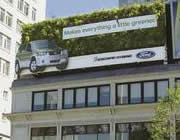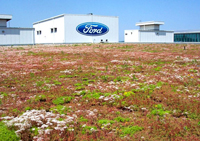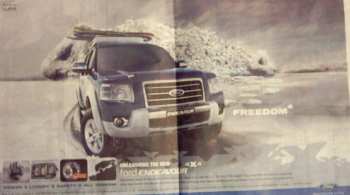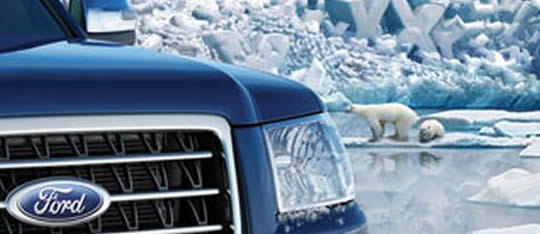 Time Magazine’s Earth Day Edition (April-May 2000) on “Heroes for the Planet”. It was littered with double page Ford advertisements boasting of Ford’s environmental achievements and according to one commentator made the magazine look like a car sales brochure. Ford claimed in one advertisement “A car so environmentally friendly it helps clean up after the one in front”.
Time Magazine’s Earth Day Edition (April-May 2000) on “Heroes for the Planet”. It was littered with double page Ford advertisements boasting of Ford’s environmental achievements and according to one commentator made the magazine look like a car sales brochure. Ford claimed in one advertisement “A car so environmentally friendly it helps clean up after the one in front”.
In April, whilst Time Earth Day edition was still on the newsstands, Ford agreed to pay fines of over a million dollars after the US EPA claimed that Ford had violated clean air laws at three of its plants in Detroit. CorpWatch, which awarded Ford with the Earthday Greenwash award, said that Ford had one of the worst environmental records of all the car makers and noted that Ford had announced that it was going to spend as much money on its environmental image as it had on launching a new model car.
According to the Union of Concerned Scientists, at the time Ford’s cars had the highest average carbon emissions of any car maker and its average fuel efficiency was also worst. The carbon dioxide emissions from Ford cars had increased by 7.4 percent in the previous decade (more than most other car manufacturers) despite well founded concerns about global warming during that time.
Ford advertisement suggesting driving a hybrid
is just as 'green' as riding a bicycle and a lot easier.
 “The Greening of the Blue oval” (see living billboard to the left) based on its forthcoming petrol-electric hybrid SUV, the Escape Hybrid (see YouTube video ad above). It claimed the vehicle would achieve 35 mpg but Ford continued producing all its fuel inefficient SUVs, meaning its average fuel economy remained at a very low 18.8 mpg, the lowest of all US car manufacturers according to the EPA.
“The Greening of the Blue oval” (see living billboard to the left) based on its forthcoming petrol-electric hybrid SUV, the Escape Hybrid (see YouTube video ad above). It claimed the vehicle would achieve 35 mpg but Ford continued producing all its fuel inefficient SUVs, meaning its average fuel economy remained at a very low 18.8 mpg, the lowest of all US car manufacturers according to the EPA.
What is more it 'only planned on producing 20,000 of its Hybrid SUVs per year, while continuing to produce almost 80,000 F-series trucks per month'.
Bill Ford Jr. had “personally lobbied Congress against raising national fuel mileage standards”, promising to achieve fuel efficiency voluntarily. He also opposed the Californian plan to allow cars that can achieve 45mpg to use car pool lanes, even without passengers. Because only Toyota and Honda hybrids could meet this standard, Ford Jr has likened the proposal to a “Buy Japanese” campaign in a letter he wrote to Governor Schwarzenegger urging him to veto the proposal. He argued that the proposal would put Ford workers and stockholders at a competitive disadvantage. Supporters of the proposal pointed out that any car company could produce a hybrid to meet the standard and this proposal will give them an incentive to do so.
 “According to Global Exchange and the Rainforest Action Network, Ford already has the technological capacity to improve its fleet-wide fuel economy to 40 mpg” but refuses to implement it. One of the worst of Ford’s vehicles, its F-150 trucks, is manufactured at its new ‘green’ Dearborn Truck Plant (pictured), which has a natural storm-water management system, waste reduction processes and the worlds largest plant-filled living roof.
“According to Global Exchange and the Rainforest Action Network, Ford already has the technological capacity to improve its fleet-wide fuel economy to 40 mpg” but refuses to implement it. One of the worst of Ford’s vehicles, its F-150 trucks, is manufactured at its new ‘green’ Dearborn Truck Plant (pictured), which has a natural storm-water management system, waste reduction processes and the worlds largest plant-filled living roof.
Ford admitted in its first “corporate citizenship report” that its SUVs emitted more pollution and greenhouse gases than regular cars and were more likely to kill other motorists. They also consume more fuel. Yet it still opposed stricter emission standards for SUVs and opposed the Kyoto protocol.

Increasing sales of SUVs (four wheel drives) has caused the average fuel efficiency of the American car fleet to decline rather than improve over the past two decades. US legislation requires passenger cars produced by each car company to average 27.5 miles/gallon (mpg) but SUVs only have to average 20.7 mpg. In 2003 new SUVs averaged 17.8 mpg under test conditions, which in the real world is likely to translate to 14 mpg.


Ford advertisement in Hindustan Times, June 25, 2007 from Orange Hues
featuring stranded polar bears
In July 2000 Ford promised that it would reduce the emissions from its SUVs by 25% by 2005 and that it would produce a gas-electricity hybrid vehicle by 2003. For this it earned further praise from environmental groups. General Motors and DaimlerChrysler followed suit with the same promise and as a result the proposed government standards, which would have increased the required average fuel economy for light trucks from 20.7 mpg to 36 by 2015, were dropped.
However in 2003 Ford reneged on its promises and General Motors and DaimlerChrysler followed suit. By 2004 the emissions from its SUVs had not improved. When over thirty environmental groups ran advertisements headlined “Bill Ford Jr or Pinocchio? Don’t buy his environmental rhetoric. Don’t buy his cars”, Ford responded with a lawyer’s letter to cease and desist.
For four consecutive years (2006-2009) Ford won the US Environmental Protection Agency's (EPA's) ENERGY STAR Award for the energy efficiency of its automobile plants. On winning in 2009 Ford urged 'its employees and customers to join the effort by reducing their personal energy use and cutting their CO2 footprints'. It outlined various actions individuals could take including changing to compact fluorescent light bulbs and making sure homes are well insulated and sealed. Using cars less was not on the list of suggestions.
The fuel efficiency of the vehicles it markets is a different matter and as we have seen above, Ford has long opposed mandatory fuel economy standards. Now that consumers are demanding more fuel economy Ford is promising to deliver better fuel economy for all its vehicles and to manufacture more smaller cars in future. However:
As recent as 2006, Ford Motor’s Chairman (and former CEO) Bill Ford said the company would build 250,000 hybrids a year by 2010. Five months later, that goal was scrapped.
In 2010 it ranked number eight of the US top toxic air polluters.